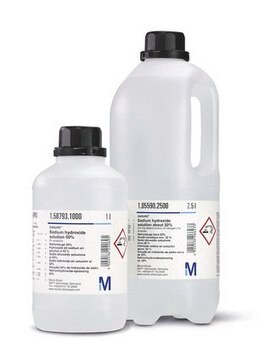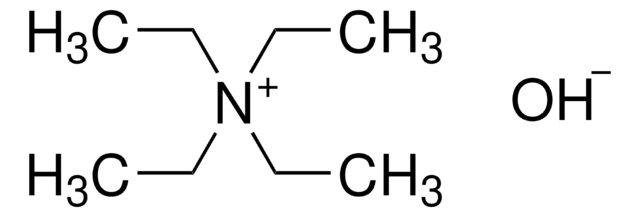1.08124
Tetramethylammonium hydroxide solution
c(C₄H₁₃NO)=0.1 mol/l (0.1 N) in 2-propanol/methanol, ready-to-use volumetric solution for titration in non-aqueous media, Titriplex®
About This Item
Productos recomendados
product name
Tetramethylammonium hydroxide solution, in 2-propanol/methanol for titrations in non-aqueous media c(C4H13NO)=0.1 mol/l (0.1 N), Titripur®
Nivel de calidad
Línea del producto
Titripur®
formulario
liquid
calidad
Analyzed in our ISO 17025 accredited QC lab
idoneidad de la reacción
reaction type: Acid-base reactions
reaction type: Redox Reactions
concentración
0.1 M
técnicas
titration: suitable
pH
14 (20 °C in H2O)
temperatura de transición
flash point 15 °C
densidad
0.79 g/cm3 at 20 °C
temp. de almacenamiento
15-25°C
Categorías relacionadas
Aplicación
- An Approach Based on an Increased Bandpass for Enabling the Use of Internal Standards in Single Particle ICP-MS: Application to AuNPs Characterization.: This study by Bazo et al. (2023) explores the use of Tetramethylammonium hydroxide solution to enhance internal standard applications in single particle ICP-MS for gold nanoparticle characterization. This method improves accuracy and reliability in nanoparticle detection (Bazo et al., 2023).
- Titanium dioxide nanoparticles assessment in seaweeds by single particle inductively coupled plasma - Mass spectrometry.: López-Mayán et al. (2022) utilized Tetramethylammonium hydroxide solution for the assessment of titanium dioxide nanoparticles in seaweeds. This approach allows for precise quantification and analysis of nanoparticles in complex matrices (López-Mayán et al., 2022).
- Determination of selenite and selenomethionine in kefir grains by reversed-phase high-performance liquid chromatography-inductively coupled plasma-optical emission spectrometry.: Bodur et al. (2021) used Tetramethylammonium hydroxide solution to effectively separate and quantify selenite and selenomethionine in kefir grains, demonstrating its utility in food chemistry applications (Bodur et al., 2021).
- Application of TMAH thermochemolysis to the detection of nucleobases: Application to the MOMA and SAM space experiment.: He et al. (2019) applied Tetramethylammonium hydroxide solution in thermochemolysis for detecting nucleobases in space mission experiments, demonstrating its application in astrobiology and space chemistry (He et al., 2019).
Características y beneficios
This volumetric solution is analyzed by our calibration laboratory D-K-15185-01-00 which is accredited according to DIN EN ISO/IEC 17025 for analysis of amount-of-substance concentrations in volumetric solutions by DAkkS (Deutsche Akkreditierungsstelle - German National Accreditation Body). The accreditation certificate can be found at www.sigmaaldrich.com/ISO17025.
Nota de análisis
Amount-of-substance concentration 0.0994 - 1.006 mol/L
Measurement uncertainty ± 0.0004 mol/L
Traceability NIST SRM
The concentration is determined by volumetric titration and refers to 20°C.
The amount-of-substance concentration of this volumetric solution is traceable to a primary standard reference material (SRM) from the National Institute of Standards and Technology, Gaithersburg, USA (NIST SRM 350 benzoic acid) by means of volumetric standard benzoic acid (article number 1.02401), certified reference material according to ISO 17034, analyzed by our accredited calibration laboratory of Merck KGaA, Darmstadt, Germany according to DIN EN ISO/IEC 17025. The uncertainty is expressed as expanded measurement uncertainty with a coverage factor k=2 covering a confidence level of 95%.
Note: The titer is a correction factor to correct for variations of the volumetric solution, the titration equipment, the temperature and other laboratory conditions. For correct titration results it is recommended to determine a titer with the laboratory specific equipment and under laboratory specific conditions directly after opening a new bottle and at regular time intervals.
Información legal
Producto relacionado
Palabra de señalización
Danger
Frases de peligro
Consejos de prudencia
Clasificaciones de peligro
Acute Tox. 3 Dermal - Acute Tox. 3 Oral - Acute Tox. 4 Inhalation - Eye Dam. 1 - Flam. Liq. 2 - Skin Corr. 1 - STOT RE 2 Dermal - STOT SE 1 - STOT SE 3
Órganos de actuación
Central nervous system
Código de clase de almacenamiento
3 - Flammable liquids
Clase de riesgo para el agua (WGK)
WGK 2
Punto de inflamabilidad (°F)
59.0 °F
Punto de inflamabilidad (°C)
15 °C
Listados normativos
Los listados normativos se proporcionan para los productos químicos principalmente. Para los productos no químicos sólo se puede proporcionar información limitada. Si no hay ninguna entrada, significa que ninguno de los componentes está en la lista. Es obligación del usuario garantizar el uso seguro y legal del producto.
EU REACH Annex XVII (Restriction List)
Certificados de análisis (COA)
Busque Certificados de análisis (COA) introduciendo el número de lote del producto. Los números de lote se encuentran en la etiqueta del producto después de las palabras «Lot» o «Batch»
¿Ya tiene este producto?
Encuentre la documentación para los productos que ha comprado recientemente en la Biblioteca de documentos.
Los clientes también vieron
Nuestro equipo de científicos tiene experiencia en todas las áreas de investigación: Ciencias de la vida, Ciencia de los materiales, Síntesis química, Cromatografía, Analítica y muchas otras.
Póngase en contacto con el Servicio técnico

![Disolución de hidróxido de tetra-n-butilamonio in 2-propanol/methanol for titrations in nonaqueous media c[(C4H9)4NOH] = 0.1 mol/l (0.1 N), Titripur®, reag. USP](/deepweb/assets/sigmaaldrich/product/images/217/795/18cba546-7592-4bb4-8b67-0b4b229e0a2f/640/18cba546-7592-4bb4-8b67-0b4b229e0a2f.jpg)








